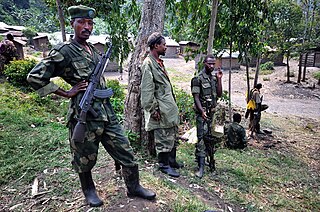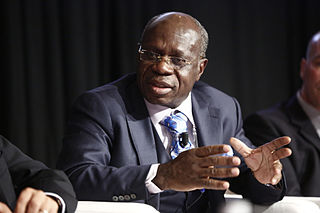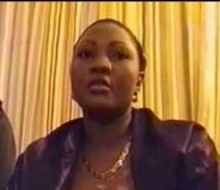| |||||
| Decades: | |||||
|---|---|---|---|---|---|
| See also: | Other events of 2004 History of the DRC | ||||
The following lists events that happened during 2005 in the Democratic Republic of the Congo .
| |||||
| Decades: | |||||
|---|---|---|---|---|---|
| See also: | Other events of 2004 History of the DRC | ||||
The following lists events that happened during 2005 in the Democratic Republic of the Congo .
The Union of Congolese Patriots was accused of responsibility for the deaths of Bangladeshi UN peacekeepers on March 25.
August 3 - The family of President Joseph Kabila received $36 million US from the Congolese state as damages and interest for the murder of the president's aunt, Espérance Kabila, by the colonel Mwamba Takiriri. [1]
September 27 - Five men dressed in the uniform of the (FARDC) broke down the door of Jean Félix Kanonge, an advisor to the union of former Gécamines agents, then the door of the bathroom where he had taken refuge. They informed him that they were there to kill him, but in after his eldest daughter begged for his life they left, taking some $200 and 5 mobile telephones. ASADHO/Katanga (African Association for the defence of Human Rights) said that there had previously been death threats against those who spoke out about Gécamines contracts with Global Enterprises Corporate and Kinross-Forrest. [2]
December 18—Constitutional referendum, initially scheduled for November 27, 2005, was a yes/no vote to accept or refuse the constitution proposed for the Democratic Republic of the Congo. [3] The vote was held on December 18 décembre 2005 and continued December 19.

Politics of the Democratic Republic of Congo take place in a framework of a republic in transition from a civil war to a semi-presidential republic.
Telecommunications in the Democratic Republic of the Congo include radio, television, fixed and mobile telephones, and the Internet.

Léon Kengo wa Dondo is a Congolese politician who served as the "first state commissioner" several times under Mobutu Sese Seko in Zaïre. He was one of the most powerful figures in the regime and was a strong advocate of economic globalization and free-market economics. He served as President of the Senate of the Democratic Republic of the Congo from 2007 to 2019.

Direct elections in the Democratic Republic of the Congo occur for the Presidency, National Assembly, and provincial assemblies. The Senate, the upper house of the legislature, is elected indirectly by members of the provincial assemblies.

Étienne Tshisekedi wa Mulumba was a Congolese politician and the leader of the Union for Democracy and Social Progress (UDPS), the main opposing political party in the Democratic Republic of the Congo (DRC). A long-time opposition leader, he served as Prime Minister of the country on three brief occasions: in 1991, 1992–1993, and 1997.
Dr. Urbain Kisula Ngoy (1940—2018) was a Congolese politician and doctor who served as governor of the Katanga Province, Democratic Republic of the Congo, from 2004 to 2007. During his time in office, he sought to end the Mai-Mai's abuse of Katanga.
The Alliance of the Presidential Majority, commonly shortened to the Presidential Majority, was the ruling political alliance in the Democratic Republic of Congo from 2006 to 2018. It was formed on 24 June 2006 by then President Joseph Kabila to support his candidacy for the 2006 general election. It held a majority in both the National Assembly and Senate until 2018, when the alliance was dissolved and succeeded by the Common Front for Congo.

Moïse Katumbi Chapwe is a Congolese businessman and politician. He was Governor of Katanga Province, located in the southern part of the Democratic Republic of the Congo, from 2007 to September 2015. He was a member of the People's Party for Reconstruction and Democracy (PPRD) until September 2015. He has been described by The Economist as "probably the second most powerful man in the Democratic Republic of Congo after the president, Joseph Kabila". Jeune Afrique named him "African of the Year" in 2015.

The Republican Guard of the Democratic Republic of the Congo, formerly known as the Special Presidential Security Group, is maintained by President Félix Tshisekedi. Military of the Democratic Republic of the Congo (FARDC) military officials state that the Garde Républicaine is not the responsibility of FARDC, but the Head of State. Apart from Article 140 of the Law on the Army and Defence, no legal stipulation on the DRC's Armed Forces makes provision for the GR as a distinct unit within the national army. In February 2005, President Joseph Kabila passed a decree which appointed the GR's commanding officer and 'repealed any previous provisions contrary' to that decree. The GR is more than 10,000 strong, and formerly consisted of three brigades, the 10th, at Kinshasa, the 15th, and the 16th, at Lubumbashi. It has better working conditions and is paid regularly, but still commits numerous crimes near their bases, including against United Nations officials.
Army General Gabriel Amisi Kumba was Chief of Staff of the Forces Terrestres, the army of the Democratic Republic of the Congo. Amisi was a former Forces armees Zairoises (FAZ) officer who was recruited into the Alliance of Democratic Forces for the Liberation of Congo (AFDL) in 1996. During the Second Congo War, Amisi was assistant chief of staff for logistics of the Rally for Congolese Democracy (RCD-G). This position was the origin of his nickname, as T-4 was the abbreviation for his position. He was implicated by Human Rights Watch in the execution of soldier Joe Lona Bifuko and in the torture of prisoners in the ANC military intelligence detention centre in Goma in 2001.
Dan Gertler is an Israeli billionaire businessman in natural resources and the founder and president of the DGI group of companies. He has diamond and copper mining interests in the Democratic Republic of the Congo (DRC), and has invested in iron ore, gold, cobalt, oil, agriculture, and banking. He may also hold citizenship of that country. As of 2022 his fortune was estimated at $1.2 billion by Forbes.

The March 23 Movement, often abbreviated as M23 and also known as the Congolese Revolutionary Army, is a rebel military group that is for the most part formed of ethnic Tutsi. Based in eastern areas of the Democratic Republic of the Congo (DRC), it operates mainly in the province of North Kivu. The M23 rebellion of 2012 to 2013 against the DRC government led to the displacement of large numbers of people. On 20 November 2012, M23 took control of Goma, a provincial capital with a population of a million people, but it was requested to evacuate it by the International Conference on the Great Lakes Region because the DRC government had finally agreed to negotiate. In late 2012, Congolese troops, along with UN troops, retook control of Goma, and M23 announced a ceasefire and said that it wanted to resume peace talks.
The following lists events that happened during 2012 in the Democratic Republic of the Congo.

General elections were held in the Democratic Republic of the Congo on 30 December 2018, to determine a successor to President Joseph Kabila, as well as for the 500 seats of the National Assembly and the 715 elected seats of the 26 provincial assemblies. Félix Tshisekedi (UDPS) won with 38.6% of the vote, defeating another opposition candidate, Martin Fayulu, and Emmanuel Ramazani Shadary, backed by the ruling party PPRD. Fayulu alleged that the vote was rigged against him in a deal made by Tshisekedi and outgoing President Kabila, challenging the result in the DRC's Constitutional Court. Different election observers, including those from the country's Roman Catholic Church, also cast doubt on the official result. Nonetheless on 20 January the Court rejected his appeal and declared Tshisekedi as the winner. Parties supporting President Kabila won the majority of seats in the National Assembly. Félix Tshisekedi was sworn in as the 5th President of the Democratic Republic of the Congo on 24 January 2019, making it the first peaceful transition of power in the country since it became independent from Belgium in 1960.

Albert Yuma Mulimbi is a Congolese businessman, economist and former chairman at the state-owned mining company Gecamines. An International Labour Organization dignitary, he is the chairman of the Congolese Employers Federation, Democratic Republic of the Congo's biggest business lobby group.

Aimée Kabila Mulengela was the alleged natural daughter of Laurent-Désiré Kabila, president of the Democratic Republic of the Congo (DRC). She was killed in her home by armed intruders on 16 January 2008. Although she had been issued a diplomatic passport as the daughter of Kabila, after her death the government claimed that she was unrelated to the former president.

Gubernatorial elections took place in 20 out of the 21 new provinces of the Democratic Republic of the Congo on 26 March 2016. The elections were the first to take place since the Congolese government has fragmented the former 11 provinces into 26 as mandated by the DRC constitution, though by the time elections occurred only 21 provinces had completed the reform process. In most of the provinces, the elected governors are members or affiliates of the Alliance of the Presidential Majority.

Félix Antoine Tshisekedi Tshilombo is a Congolese politician who has been the President of the Democratic Republic of the Congo since 24 January 2019. He is the leader of the Union for Democracy and Social Progress (UDPS), the DRC's oldest and largest party, succeeding his late father Étienne Tshisekedi in that role, a three-time Prime Minister of Zaire and opposition leader during the reign of Mobutu Sese Seko. Tshisekedi was the UDPS party's candidate for president in the December 2018 general election, which he was awarded, despite accusations of irregularities from several election monitoring organisations and other opposition parties. The Constitutional Court of the DRC upheld his victory after another opposition politician, Martin Fayulu, challenged the result, but Tshisekedi has been accused of making a deal with his predecessor, Joseph Kabila. The election marked the first peaceful transition of power since the state became independent from Belgium in 1960.
Carbone Beni, by his full name Carbone Beni wa Beya, is a human rights defender, Congolese pro-democracy activist and co-founder of the citizens' movement Filimbi.
Gael Bussa Obambule is a Congolese lawyer and politician. He was elected National Deputy in the constituency of Budjala, in the province of South-Ubangi, in the 2018 Democratic Republic of the Congo general election.